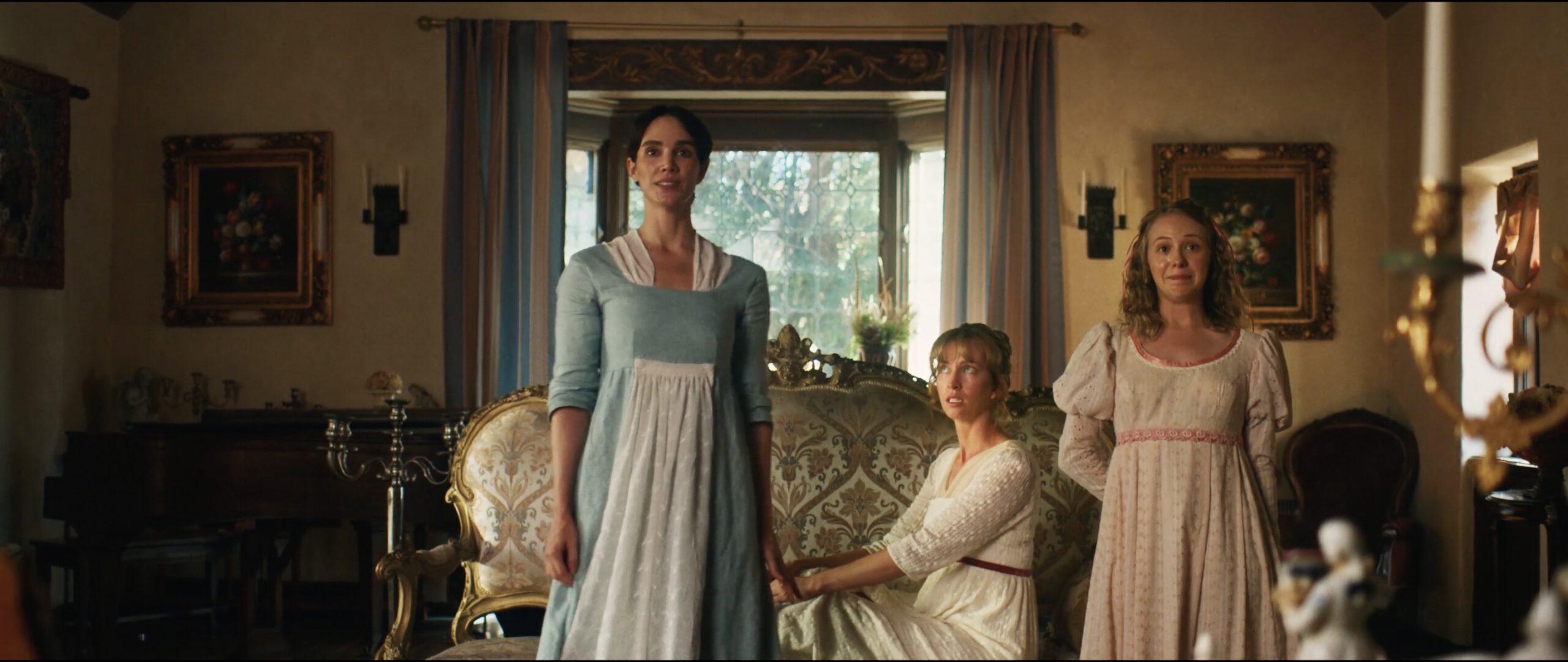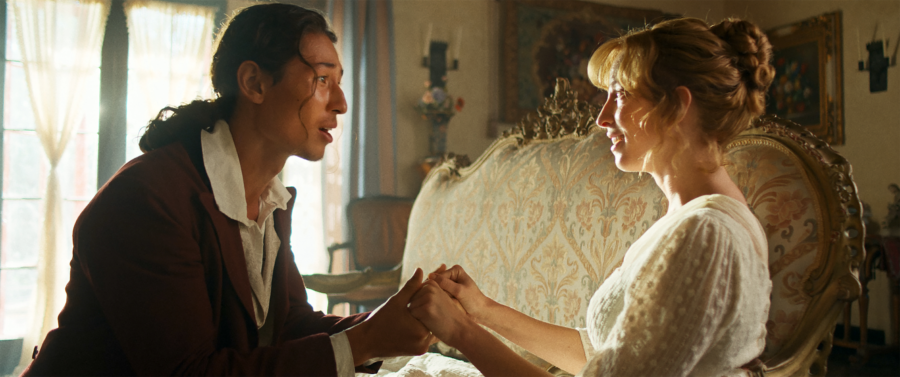
Interview with Julia Aks and Steve Pinder
Truly successful comedy provokes meaningful thought and conversation from audiences, providing laughs first, but ultimately saying something more profound underneath its jovial exterior. This is a clear throughline in “Jane Austen’s Period Drama,” a short film premiering at the 2024 Tribeca Film Festival on June 7, written and directed by longtime creative partners Julia Aks and Steve Pinder. Meeting in 2016, Aks and Pinder quickly discovered their knack for parody and have worked together on an array of songs posted on Aks’s YouTube channel including “(SAY) PLEASE ME”, “YOU ARE MY ROCK (MY DWAYNE, MY JOHNSON)”, and “GASABLANCA.” Many of Aks’s and Pinder’s parodies center around modern pop songs or films but “Jane Austen’s Period Drama” proves that the duo can hilariously pick apart classics while still delivering relevant commentary.
The short follows Miss Estrogenia Talbot as the handsome Mr. Dickley prepares to propose until Estrogenia gets her period which Mr. Dickey mistakes for an injury. This submerges the Talbot family in chaos as they debate whether or not Estrogenia should inform Mr. Dickley of his error, potentially ruining the proposal. The film hilariously mocks social norms and feminine expectations of the time, conflating these misogynistic standards with those we still see today, especially regarding menstruation. Periods have been portrayed in film before and are recently steering away from their taboo connotations, but many depictions are used for cheap laughs and paint the process as something grotesque. “Jane Austen’s Period Piece” however, makes an adamant effort to ignite a conversation about a part of life that so many undergo and often feel ashamed to voice feelings about. Seeing the clash of a setting associated with so much sophistication and propriety with a discussion of a topic that would barely even be whispered about during that time is refreshing and encourages open-mindedness in audiences of today. You can see “Jane Austen’s Period Drama” at the Village East By Angelika Theater on Monday, June 10 at 8:45 pm or the AMC 19th Street Theater on Saturday, June 15 at 8:30 pm and Sunday, June 16 at 9:15 pm.

Q. Obviously Jane Austen’s novels and entire aesthetic were a major influence for this film, but what other inspirations did you draw from? Did you also examine the film adaptations of Austen’s classics?
A. SP: The Austen film adaptations were really our springboard into this world. I read Emma in college but didn’t really fall in love with the world of Jane Austen until seeing Ang Lee’s Sense and Sensibility. Emma Thompson’s character and performance were a great source of inspiration, as were the style of the film, the camera movement, the painterly images, and the rustic locations and set design.
JA: We also love and studied Joe Wright’s Pride and Prejudice. The way both those films portray Austen’s characters in their environments is so tender and lush. Tonally, we looked at modern comedies, like Bridesmaids, which have a good balance of jokes and heart.
SP: For visual style, we looked beyond Austen films, too. Films like Barry Lyndon, Dangerous Liaisons, and The Beguiled became guideposts for us, as we wanted to capture the filmic qualities of period (not period) dramas.
Q. Jane Austen’s literature has garnered such adoration for her intricate writing style and discussions and dissections of social hierarchies and standards of her time. Talk about how this film explores femininity and womanhood as these topics are crucial fixations of Austen’s stories.
A. SP: You mean beyond all the talk of bleedin’ vaginas?
JA: Yes, Steve, let’s go beyond that.
SP: Well, then I guess you could say we mostly followed Jane Austen’s lead.
JA: True. Her lead characters are often pretty self-possessed women who question the social absurdities around them. A lot of the tight-lipped etiquette of 1813 England is actually still a reality for a lot of people in 2024 when it comes to menstruation specifically. So Austen’s world actually felt like a very natural fit for this story.
Q. The film is hilarious but one of the most brilliant subtleties in its humor is the characters’ names. What was the process of coming up with Estrogenia and Mr. Dickley? Were there any names that you thought of that didn’t make the final cut?
A. JA: The names Estrogenia and Mr. Dickley came to me rather quickly, early on. But you’d better believe we have a huge document of unused names just waiting to be set free.
SP: As far as process goes, there isn’t much of one. It’s really just, like, we look at a map of the UK, change a couple of letters around, and without much ado, it usually sounds like genitalia. There’s actually a place called, “Ditchley,” for example.
Q. One of the most immersive factors of the film is the set design. The beautiful chairs and tea sets illustrate the vibrant world Jane Austen occupied. How were these pieces secured for the film?
A. SP: There are two answers to that question. First, we found a house in La Cañada, California (of all places) that we felt could work for the interiors. Luckily for us, they had quite a bit of set decoration already there in the house—things like the paintings on the walls, a piano, a harp. But everything that wasn’t already there was sourced by our incredible Production Designer, Dong Lei.
JA: Dong made miracles happen with very little time and resources. He would be on set all day for another job, and then Facetime us at 10:30 pm from a rental house to show us five options for Dickley’s notebook. He was amazing. Great attitude and great work.
Q. Julia, talk about your experience co-writing, co-directing, and starring in this film. How can women combat the mentality that we can just “do it all” but simultaneously showcase that we are more than capable of stepping up and playing so many important roles in film and other workspaces?
A. JA: Honestly, I tried really hard not to do it all for this one. I wanted to focus on being behind the camera with Steve. But after a lot of discussion, Steve convinced me that it made the most sense for me to play Estrogenia in this version of the story. He and I have a short-hand when it comes to me performing, and I knew the tone of the script better than anyone. Steve and I prepped like crazy together though so our directorial vision was cohesive when we walked onto set the first day. Directing and acting at the same time was a challenge. Those skills use the polar opposite parts of your brain. When directing, you’re keenly watching every nuance of each take. When you’re acting, ideally, that part of your brain is shut off and you’re completely in the moment with your scene partner. So especially because we had to move so fast during shooting -(we shot twelve pages in two days) there was hardly any transition time for my brain to switch between those jobs. I’m not opposed to doing both again, but I don’t think I’d want to direct and also play the lead. I love a character cameo. Regarding the “do it all” mentality, I have a history of trying to do too much and burning out. So for the first time maybe ever, I went into this project being conscious to take care of myself along the way. I scheduled rest, delegated, communicated, and surrounded myself with people who respected all that. I know now that burning out serves no one, and I’ve got nothing to prove to anyone but myself.
Q. Steve, talk about your and Julia’s partnership which has spanned almost a decade beginning in 2016 after working on a The Sound of Music parody together. What have you learned from this continuous collaboration?
A. SP: Julia and I have an easy friendship and an easy creative partnership. She’s the only collaborator I’ve ever had who can almost always see the movie I’m seeing before it’s made. I say almost always because we still do have creative disagreements. But when we have them, what I’ve learned, and continue to learn is that there is almost always a better version of the thing that lies in the yet-to-be-uncovered space between our two separate visions. It is a great joy to work with someone like Julia who is willing to talk and question and discuss until those better versions arise from within the collaboration.
Q. Comedy and parody seem to be your desired genres and you both certainly thrive in them. Are there other directions you want to experiment with in film? What’s a project you’ve always wanted to do but may seem a bit daunting?
SP: We have more ideas than we know what to do with. We would love to write and direct a musical together at some point, for stage and/or film. We also both love opera and have half-joked about doing a space opera.
JA: A literal opera. In space. The Fifth Element, the opera?!